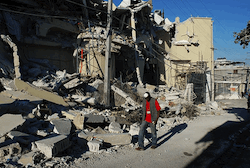 Channeling my inner Rahm: never waste a good crisis. The earthquake in Haiti was, and continues to be, tragic. However, at least one entrepreneur sees an opportunity to rebuild a critical part of Haiti’s infrastructure and probably make a few bucks in the meantime:
Channeling my inner Rahm: never waste a good crisis. The earthquake in Haiti was, and continues to be, tragic. However, at least one entrepreneur sees an opportunity to rebuild a critical part of Haiti’s infrastructure and probably make a few bucks in the meantime:
John Stanton, founder of Voice Stream and former chief executive of T-Mobile USA, wants the Haitian government to forget about rebuilding its copper wire communications network. Instead, he thinks Haiti should go mobile. … Stanton called for the Haitian government to create an all-wireless nation with more robust networks for the population of nearly 10 million and to build an economy centered on mobile technology.
Should Haiti choose to open up some wireless bandwidth, Stanton claims that he’ll put up $100 million of his company’s money. While the idea has merit, implementation involves a few caveats, one of which comes from PPI-alum Rob Atkinson, now president of the Information Technology & Innovation Foundation. He notes, ”This could be a good strategy for as long as 20 years even, but I just don’t see it as an ultimate strategy because at a certain point you need fixed wire for services that require more bandwidth.”
Furthermore, there’s a question about competition — Stanton is angling for the first-mover advantage and trying to seize the initiative where he sees opportunity. But as with any government contract (even Haitian ones after a massive natural disaster), there’s the worry that a single-source supplier will distort the upside while dragging its heels on the outputs.
But on the whole, the idea tracks closely with what Mike Derham and I advocated in a PPI Policy Memo on Haitian reconstruction. We said that Haiti should embrace cell phone technology as a vital tool in facilitating capital flow:
Sub-Saharan Africa has adopted programs like M-PESA to allow people to use their cell phones as checking accounts. The time and effort necessary to establish a similar system in Haiti would be worthwhile. Credit can be transferred to individual phone numbers — including from overseas — and that credit can then be used for purchases from other phone owners who have a similar plan (including prepaid) from their provider. Cell coverage is one of the few institutions that covers all of Haiti. It is also an institution that has worked through the crisis, and that the American military is working to make sure stays running.
Wireless technology should a vital institution in Haiti, and Stanton’s offer should be evaluated seriously with that in mind.
Photo credit: http://www.flickr.com/photos/ifrc/ / CC BY-NC-ND 2.0
Tags: Haiti, Information Technology & Innovation Foundation, Infrastructure, John Stanton, Rob Atkinson, science and technology, telecommunications, Voice Stream




